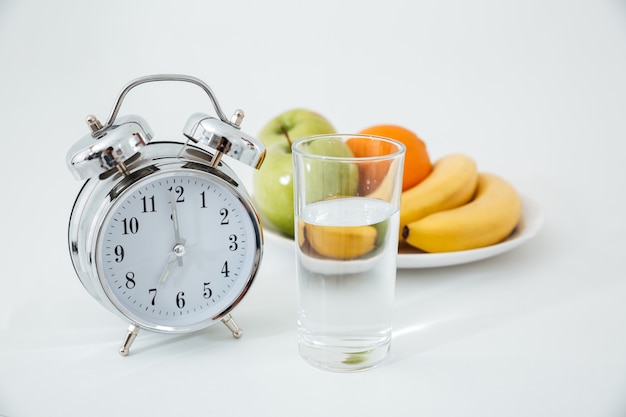The best time to take vitamins
Sometimes food consumption cannot provide the body’s need for minerals and various vitamins, that’s why nutritionists advise people to use vitamins and food supplements in their diet. Most of the vitamins and nutritional supplements are available in the form of syrups or tablets in the market, and each has a separate instruction for consumption; Therefore, it is necessary to know the best time to take vitamins so that they are better absorbed by the cells of the body.
The way vitamins and food supplements are absorbed is affected by the time period of their consumption, because these substances may affect the function and metabolism of the body, for example, some vitamins speed up the absorption of food, so they should be taken together. Eat food, or some other sleeping pills, it is better to use it at night and before going to bed.
Considering that vitamins and food supplements are important and necessary for the health of the body and if they are not consumed correctly, they can be harmful to the body, if you also use these useful nutrients in your diet and want to know the best time When to take vitamins and food supplements, stay with us in the rest of this article from Ghafari Diet.
The best time to take vitamins
In order for the human body to function properly, it needs 13 types of vitamins, among which 9 are water-soluble and 4 are fat-soluble. Although the vitamins needed by the body are found in all kinds of foods, some people need to use certain vitamins and nutritional supplements throughout the day to meet their nutritional needs.
You can consume these nutrients at any time of the day, but some of them need to be used in certain situations for better absorption in the body. For this reason, it is good to know when is the best time to take vitamins and food supplements in order to absorb these substances.
Water soluble vitamins
Water-soluble vitamins do not need to be taken with food for better absorption, including vitamin C and B vitamins. You should take these vitamins regularly; Because, unlike fat-soluble vitamins, they are not easily stored in body tissues, and because they are water-soluble, their excess amount is excreted through urine. Water-soluble vitamins are not easily stored in the body, so you must take them regularly to maintain normal levels.
Vitamin C intake time
This vitamin has many vital roles in the body, including being required for immune system health, neurotransmitters and collagen synthesis, and acting as a powerful antioxidant. Vitamin C supplements are also known as ascorbic acid, vitamin C, and vitamin C, and they are one of the most important and essential nutrients for the body, which are usually available in the form of capsules, effervescent tablets, and chewable tablets. The best obesity diet for fast weight gain
when is the best time to take vitamins
Vitamin C supplements can be taken at any time during the day, with or without food, but if ascorbic acid is taken with food, it can help reduce possible gastrointestinal side effects caused by high acidity. Remember to store vitamins and vitamin C supplements in a cool, dark place, as these nutrients are sensitive to heat and light.
Considering that the excess amount of vitamin C is removed from the body, people are not allowed to take doses higher than 1000 mg, unless a specialist doctor determines that the person needs treatment with a high dose of vitamin C. Fruits and vegetables such as kiwi, strawberries, oranges, papaya, red peppers and broccoli contain vitamin C.
Time to take vitamins of the B family
Vitamins of the B family are mostly used to reduce stress and increase energy levels and include 8 types of vitamins, each of which has a specific function in the body. You can take B vitamins alone or as a whole in the form of a supplement called B-complex. Considering that vitamins of the B family increase the body’s energy level, the best time to consume vitamins of this group is after waking up.
In addition, B vitamins are water-soluble vitamins, so you can take these supplements both with food and with food at any time of the day. But if you are one of those people who lack vitamin B12, it is better to take this supplement in the morning on an empty stomach and with water, so that it works better.
Fat soluble vitamins
Unlike water-soluble vitamins, fat-soluble vitamins depend on fat for better absorption in the body, which is why it is recommended to take fat-soluble compounds with meals containing fat. Vitamin D, vitamin E, vitamin A and vitamin K are in this group.
Time to take vitamin A
One of the common nutritional problems in developing countries is the lack of vitamin A, which usually occurs due to an increase in the need for this vital substance or a decrease in its absorption by the body’s cells, and this problem has caused many people to suffer from vitamin deficiency. A, including pregnant women, lactating women and people with cystic fibrosis.
Most vitamin A supplements are nutraceuticals that are either manufactured as vitamin A derived from fish liver or available over the counter as vitamin A carotenoids. (Vitamin A carotenoid is a plant compound that the body can easily convert into vitamin A.) For better absorption of vitamin A supplements, you can take them with the main meals of lunch and dinner that contain fatty foods.
Don’t forget, if you follow a balanced and appropriate diet, you don’t need to take vitamin A supplements; Because according to research, consuming high doses of vitamin A during the day can increase the risk of cancer; Therefore, it is better to avoid taking high-dose vitamin A supplements, and if your doctor determines that your body needs high-dose vitamin A, then take this amount.
Vitamin D intake time
Vitamin D is essential for cell growth, bone health, and immune system function, but unfortunately, a large number of people around the world are deficient in this food supplement. You can take this vitamin at any time of the day, but you need to take these supplements with meals or snacks containing fat to ensure their optimal absorption.
A study on 50 elderly people showed; People who took a vitamin D supplement with a fat meal had a 32% higher absorption of vitamin D than people who took it with a fat-free meal. However, some vitamin D supplements may not be affected by diet, such as oil supplements and microsomal vitamin D (vitamin D encapsulated in globular fatty acids).
Regarding the time of taking vitamin D, it is necessary to note that the activation of this supplement depends on the presence of sufficient magnesium levels in the body, so to maintain its normal level, make sure that your body receives enough magnesium. It is important to note that; Some fat-soluble vitamins such as vitamin E may affect the absorption of vitamin D, or the consumption of vitamin K along with vitamin D can be beneficial and desirable for the density of the body’s bone minerals.
Vitamin E consumption time
Vitamin E is essential for the better functioning of the immune system and healthy blood flow and acts as a main antioxidant in the body and is considered a popular food supplement. This nutrient is found in many foods and its deficiency is rare, unless a person has certain diseases such as short bowel syndrome, Crohn’s disease or cystic fibrosis, in which case it is necessary to use vitamin E as a dietary supplement.
Specialist doctors advise people to take vitamin E supplements with meals. A 2019 study of 27 women showed that vitamin E absorption was better when fat was consumed throughout the day, suggesting that when there is enough fat in meals Vitamin E does not need to be taken with meals containing fat.
It should be noted that despite the necessity of vitamin E, its high consumption in the form of food supplements can be harmful for some people, and the consumption of high doses of this vitamin may increase the risk of prostate cancer in healthy men; Therefore, it is better to consult a specialist doctor before taking this vitamin in your diet.
Vitamin K intake time
This vitamin, which is a fat-soluble compound, includes vitamin K1 or phylloquinone and vitamin K2 or menaquinone, and is needed for the health of the heart and bones, as well as blood coagulation. Clinically, vitamin K deficiency is very rare in adults, except for those with bleeding and malabsorption disorders or those taking medications that can interfere with vitamin K absorption.
The timing of taking various vitamins, including vitamin K, can be any time of the day with a meal or snack containing fat. Since most people get this vitamin through their diet, high-dose supplements are generally not recommended unless prescribed by a healthcare professional.
Taking vitamin K is safe and has no specific side effects, but these supplements may interfere with some anticoagulant drugs, so if you are taking these drugs, it is better to consult your doctor before taking vitamin K. Remember to take vitamin K separately from fat-soluble vitamins such as E and A, of course, taking this supplement with vitamin D is beneficial for the body and promotes and improves bone health and normal calcium levels in the body.



